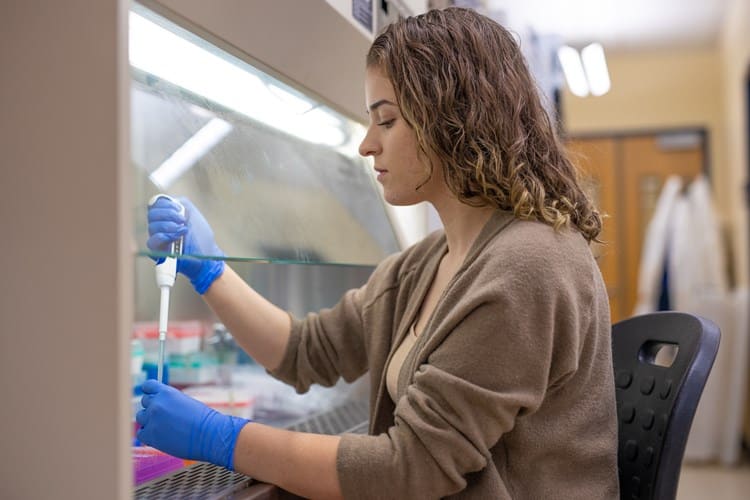
As a senior in high school, Teagan Kuzniar began her research journey after joining a West Virginia University environmental engineering lab. It was here that Kuzniar developed her passion for environmental microbiology.
Kuzniar now spends her time in the Environmental Microbiology laboratory at WVU where she works on her own independent research project that she developed in the summer of 2021 as part of the WVU Summer Undergraduate Research Experience (SURE) program. The project utilizes quantitative stable isotope probing to explore microbial responses from wetlands to climate warming.
“Teagan has been an amazing addition to my research program,” said Dr. Ember Morrissey, assistant professor of Environmental Microbiology and mentor to Kuzniar. “As she has continued to learn more about environmental microbiology and better understand the processes of scientific research, Teagan has begun to develop her own research questions.”
Recently, Kuzniar became a co-author on a paper published in Water Research, a Journal of the International Water Association (IWA), which focused on microbial community responses to unconventional oil and gas development in headwater streams.
“My involvement in research has made me fall in love with science,” Kuzniar said. “My research mentor, Dr. Ember Morrissey, has always encouraged me to ask questions and then find the answers. Something so simple can feel so rare and empowering.”
Because of her environmental research and public service, Kuzniar has been named a 2021 Udall Scholar. The Udall Foundation awards scholarships to college sophomores and juniors for leadership, public service, and commitment to issues related to Native American nations or to the environment.
As a native Appalachian, much of Teagan’s research and outreach focuses on issues in her state and region.
“Being selected as a Udall Scholar and representing both WVU and the state of West Virginia on a national scale is a tremendous honor,” Kuzniar said. “Going forward, I will strive to represent West Virginians in the call for better environmental protection and remediation.”

To support her native region, Kuzniar serves as the Editor-in-Chief of the Mountaineer Undergraduate Research Review (MURR), which is WVU’s student-led undergraduate research journal. As part of her honors program, Kuzniar is seeking to expand the journal throughout West Virginia, as MURR is the only multidisciplinary undergraduate research journal in the state.
“Through the expansion of MURR in West Virginia and Appalachia, I am hoping to make the process of publication more accessible and attainable for those who historically have not had representation in the scientific community,” Kuzniar said.
Kuzniar explained that due to increased accessibility, West Virginians will be able to write about topics that afflict the state like hydraulic fracturing, mountaintop removal, acid mine drainage, abandoned mines, illegal dumping and other forms of environmental exploitation.
“Therefore, the expansion of MURR will bring an awareness of the environmental problems affecting West Virginians, thereby encouraging stronger policy to protect the people and lands of West Virginia.”
Kuzniar applied for both the Truman Scholarship, the nation’s top graduate fellowship award for aspiring public service leaders, and the Goldwater Scholarship, which is given to students with great potential to make a significant contribution to research in their chosen field.
“Teagan is an ambitious undergraduate researcher, student, and person. I admire her earnestness in channeling her passions through institutional mechanisms and scholarships.,” said Kevin Walden, program coordinator in the Office of Undergraduate Research. “I see her as a model for other students, not only because she is committed to applying research to improving the quality of water and environmental public health, but because she genuinely cares about the wellbeing of those around her, including those who are impacted by these multi-dimensional issues.”
Walden said that since then, Kuzniar has displayed key leadership skills through MURR such as clarifying the values of the journal, inspiring a shared vision and enabling others to act.
“Given her consciousness, leadership, and tenacity, I am confident Teagan will make a positive impact on the world around her.,” Walden said.
Kuzniar’s ability to explain complex scientific topics at an accessible level is invaluable and within MURR, she displays leadership with her vision, values and strong communication skills.
“Seek out your own opportunities and speak openly about your goals,” Kuzniar said. “Your professors and mentors can be your greatest support systems, but you have to be vocal about your ambitions.”
Written by: Alayna Fuller, West Virginia University; used with permission.
Please visit here to read the original article.
Founded in 1978, the Council on Undergraduate Research (CUR) focuses on providing high-quality and collaborative undergraduate research, scholarly, and creative activity. Among the many activities and networking opportunities that CUR provides, the organization also offers support for the professional growth of faculty and administrators through expert-designed institutes, conferences, and a wide-range of volunteer positions. The CUR community, made up of nearly 700 institutions and 13,000 individuals, continues to provide a platform for discussion and other resources related to mentoring, connecting, and creating relationships centered around undergraduate research. CUR’s advocacy efforts are also a large portion of its work as they strive to strengthen support for undergraduate research. Its continued growth in connections with representatives, private foundations, government agencies, and campuses world-wide provides value to its members and gives voice to undergraduate research. CUR is committed to inclusivity and diversity in all of its activities and our community.
CUR focuses on giving a voice to undergraduate research with learning through doing. It provides connections to a multitude of campuses and government agencies, all while promoting networking and professional growth to its community.


